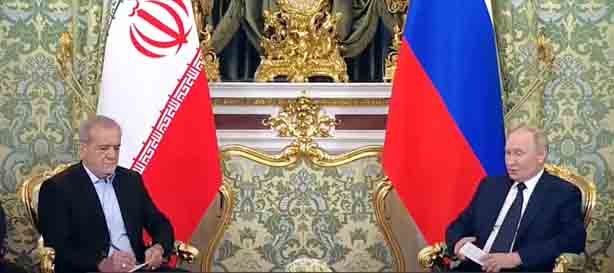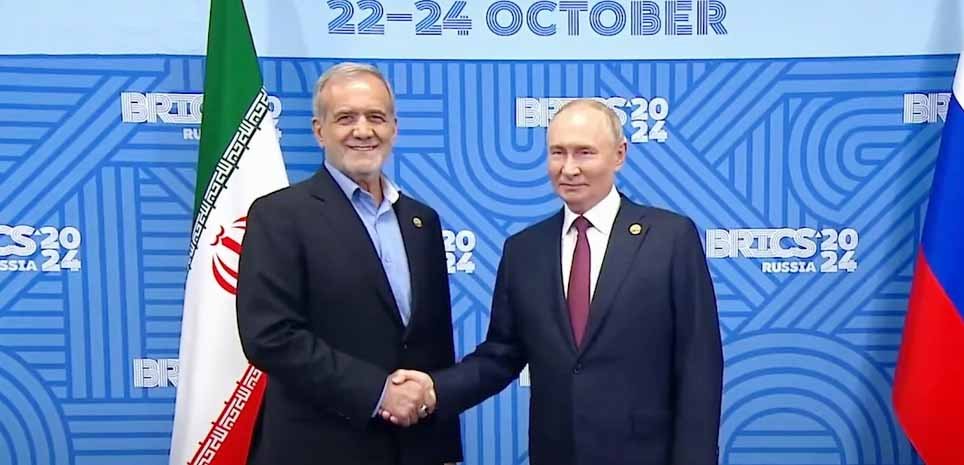In a situation that has attracted the attention of the international community, Russia and Iran are considerably boosting up their military collaboration. This decision signals a key turning point in the bilateral relations between the two states, with both attempting to enhance their strategic positions amid rising global tensions and increasing pressure from Western powers. As Russia confronts heavy penalties over its activities in Ukraine, and Iran grapples with the impact of continued restrictions connected to its nuclear program, the expansion of military links acts as a defiant response to perceived external threats.
Strengthening Strategic Military Alliances
Russia and Iran’s strengthened military relationship comes in the aftermath of an increasingly complex geopolitical scenario, notably within the Middle East. According to Reuters, high-level discussions have been place between important military and political officials from both nations to improve defense ties and share experience in areas such as counterterrorism, air defense, and nuclear technology. These meetings underscore both governments’ determination to improving their military capabilities as they jointly address escalating foreign concerns.
Russian President Vladimir Putin and Iranian Supreme Leader Ayatollah Ali Khamenei have announced their desire to enhance military ties as a strategy of enhancing their country’ global influence. This action is of exceptional significance in view of the continuing hostilities in Ukraine and Syria, where Russia and Iran have become major military partners. Both powers have backed Syrian President Bashar al-Assad’s regime, with Russian planes and Iranian military advisors helping ground operations.
A report by The Guardian showed that at these discussions, the spotlight was also placed on joint military drills. The two countries have investigated the notion of conducting more regular and sophisticated drills to strengthen the interoperability of their armed forces. These exercises could vary from large-scale field training to particular counterterrorism operations aimed at undermining terrorist groups operating in Syria and Iraq.
Expanding Military Cooperation and Joint Exercises
The increased partnership between Russia and Iran is not confined to verbal agreements but also entails the exchange of important military technologies and experience. One of the most amazing aspects of this partnership is the planned provision of cutting edge Russian-made air defense systems, including the S-400 missile system, which Iran has been frantic to have. As highlighted by The Washington Post, Iran has long worked to enhance its air defense capacities in the midst of rising tensions with local rivals, including Israel and Saudi Arabia. By getting the S-400, Iran would essentially boost its defensive structure and be more situated to fight new airstrikes.
Additionally, the two countries have resolved to direct agreeable military practices in the next years. These drills are supposed to work on the coordination between Russian and Iranian powers, equipping them to cooperate perfectly in event of a huge clash. The actions are probably going to center in on conditions including counterterrorism jobs, digital combat, and long range rocket defense. Al Jazeera states that the two nations will likewise concentrate on the expansion of collaborative military innovations, like robots, long-range missile systems, and anti-submarine warfare equipment.

Economic Implications of Strengthening Military Ties
The emerging military union with Russia and Iran has significant monetary repercussions. The two nations have experienced debilitating economic sanctions from the United States and its European allies, which substantially harm their specific economies. By strengthening their military cooperation, Russia and Iran are reinforcing their guard capacities as well as preparing the path for more prominent financial cooperation.
According to The Financial Times, Russia has become a significant supplier of weaponry and military technology to Iran. Iran, in turn, has supplied Russia with access to critical regional resources, including oil and natural gas. This mutually advantageous relationship allows both states to bypass Western sanctions and retain crucial commercial and military operations. Russia is also examining ways to work with Iran on energy projects, notably in areas such as oil extraction and refining.
This stronger military and financial partnership may likewise operate as an offset to Western impact in the Middle East. As Russia and Iran build their military alliance, they are not just changing the overall influence in the region yet furthermore testing the well established predominance of the United States and its companions in global affairs.
International Reactions and Concerns
The increasingly strong connections between Russia and Iran have not gone ignored in the international community, particularly in the United States and the European Union. Western officials have expressed anxiety over the potential ramifications of such a collaboration, expressing concerns over the increasing destabilization of the Middle East and the likelihood of heightened military hostilities.
According to The New York Times, Western diplomats have cautioned that the deepening partnership between Moscow and Tehran could empower both states in their respective military campaigns. This cooperation may lead to a tougher posture in continuing wars, particularly in Syria, where both countries have supported the Assad administration against rebel troops.
In addition to concerns over regional instability, experts worry about the possibility for the proliferation of powerful military technologies. The United Nations has voiced worry that the exchange of missile defense systems and other high-tech equipment between Russia and Iran could fuel more militarization in the region, leading to an arms race in the Middle East.
A New Era of Collaboration in the Middle East
While the West voices concerns, some observers consider the increasing alliance between Russia and Iran as a potential for a transformation in the Middle East’s power structure. Foreign Policy notes that the strengthening relationship could lead to a new regional order in which Russia and Iran work together to influence outcomes in Syria, Iraq, and other regions of the Middle East.
The cooperation has also begun to have a ripple effect on other regional actors, including Turkey, Israel, and Saudi Arabia. These countries are closely watching Russia and Iran’s deepening cooperation, with some experts believing that this new alignment may compel these countries to reassess their own alliances and military strategies. Israel, in particular, has expressed concerns over Iran’s rising influence in Syria and has warned that it will take actions to prevent any military build-up by Iranian soldiers near its borders.
Conclusion
The increasing military relations between Russia and Iran constitute a significant shift in world geopolitics. As both countries continue to confront external pressures from the West, their cooperation offers them with a means of counteracting sanctions and enhancing their defense capabilities. However, this tightening of links also raises fears among Western countries, who fear that it could lead to increasing regional instability, a more militarized Middle East, and wider dissemination of advanced weapons technology.
As Russia and Iran determine their course ahead in this military cooperation, the international world will be watching intently. The long-term repercussions of this collaboration on global security and regional dynamics remain undetermined, but one thing is clear: the emerging connection between these two countries will have major implications for the Middle East and beyond.
Sources
- Reuters: Russia and Iran Strengthen Military Ties Amid Rising Tensions
- The Guardian: Russia and Iran Forge Stronger Military Alliance
- The Washington Post: Russia and Iran’s Strategic Defense Collaboration
- Al Jazeera: Military Cooperation Between Russia and Iran: Implications and Consequences
- The Financial Times: Russia and Iran: A New Economic and Military Partnership
- The New York Times: Western Concerns over Russia-Iran Military Collaboration
- Foreign Policy: Russia-Iran Partnership: Redefining Power Dynamics in the Middle East

